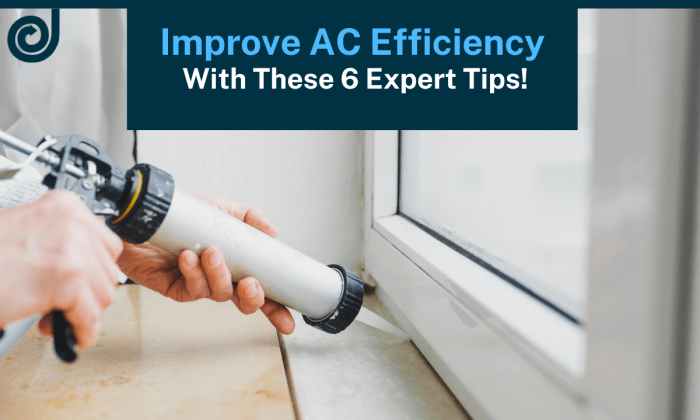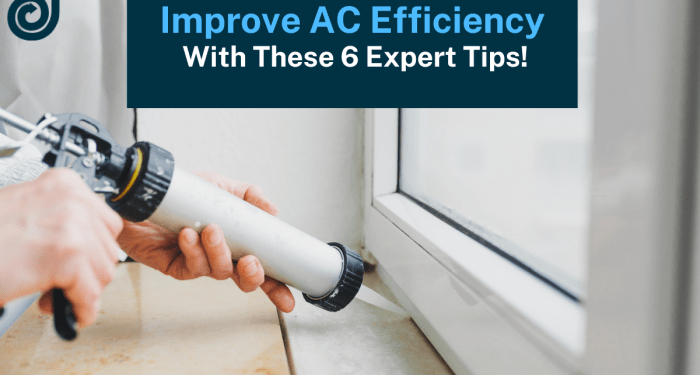Kicking off with How to Improve AC Performance Without Replacing It, this opening paragraph is designed to captivate and engage the readers, providing an intriguing overview of the topic. As we delve into the various ways to enhance AC performance without the need for a full replacement, readers will discover practical tips and insights to optimize their cooling systems.
Understanding AC Performance
When it comes to understanding AC performance, there are several key factors that come into play.
Factors affecting AC performance include the age of the system, regular maintenance, proper installation, and the quality of components used. All these elements can impact how well your AC functions.
Impact of Poorly Performing AC System
A poorly performing AC system can have a significant impact on both comfort and energy efficiency. When an AC system is not functioning optimally, it may struggle to cool or heat your space effectively, leading to discomfort for occupants. Additionally, inefficient AC systems tend to consume more energy, resulting in higher utility bills.
Moreover, a poorly performing AC system can also lead to increased wear and tear on the unit, potentially shortening its lifespan and requiring costly repairs or replacements in the long run.
Signs of Suboptimal AC Performance
- Uneven cooling or heating throughout the space
- Weird noises coming from the unit
- Foul odors when the AC is running
- Increased energy bills without a corresponding increase in usage
- Frequent on/off cycling of the system
Regular Maintenance Tips
Regular maintenance is crucial for ensuring your AC unit functions efficiently and effectively. One of the key aspects of AC maintenance is cleaning or replacing the filters on a regular basis. This helps improve air quality, maximize airflow, and reduce strain on the system, ultimately leading to better performance and longevity of the unit.
Cleaning or Replacing AC Filters
AC filters should ideally be cleaned or replaced every 1-3 months, depending on usage and the type of filter. Here are the steps to follow:
- Turn off the AC unit before attempting to clean or replace the filter.
- Locate the filter panel on your unit, which is usually near the return air duct.
- Remove the filter carefully and inspect it for dirt, dust, or debris.
- If the filter is reusable, clean it by vacuuming or washing with mild soap and water. Allow it to dry completely before reinserting.
- If the filter is disposable, replace it with a new one of the same size and type.
- Securely reattach the filter panel and turn the AC unit back on.
Importance of Regular Maintenance
Regular maintenance not only improves AC performance but also helps in reducing energy consumption and extending the lifespan of the unit. By keeping the filters clean, you ensure that the system runs smoothly, provides better air quality, and prevents breakdowns or costly repairs in the future.
Recommended Frequency for Professional AC Maintenance Checks
It is advisable to schedule professional AC maintenance checks at least once a year, preferably before the start of the cooling season. A trained technician can inspect the system, clean components, check refrigerant levels, and address any potential issues before they escalate.
Optimizing Airflow
Improving airflow in your AC system is crucial for enhancing its performance and efficiency. Proper airflow ensures that your AC unit can effectively cool your space without straining or overworking itself.
Checking and Improving Airflow
- Regularly clean or replace air filters to prevent blockages and allow air to flow freely.
- Inspect vents and ducts for any obstructions such as furniture, curtains, or debris.
- Ensure that vents are open and not blocked by any objects that could hinder airflow.
- Consider using a fan to help distribute cool air more evenly throughout the room.
Significance of Proper Airflow
Proper airflow not only improves cooling efficiency but also helps extend the lifespan of your AC unit by reducing strain on the system.
Tips for Keeping Vents and Ducts Unobstructed
- Regularly vacuum and dust vents to prevent buildup that can restrict airflow.
- Ensure that furniture or other objects are not blocking vents or return air grilles.
- Consider professional duct cleaning to remove any debris or mold that could be obstructing airflow.
- Adjust furniture placement to ensure that vents are not blocked by large items.
Enhancing Insulation and Sealing

Insulation and sealing play a crucial role in improving AC performance and energy efficiency in your home. By properly insulating and sealing gaps, you can reduce the workload on your AC system, leading to better cooling and lower energy bills.
Importance of Sealing Gaps and Leaks
- Sealing gaps in windows, doors, and ductwork prevents cool air from escaping and warm air from entering, helping to maintain a consistent indoor temperature.
- Leaky ducts can lead to up to 30% energy loss, making your AC work harder to cool your home.
- Proper sealing also improves indoor air quality by preventing dust and pollutants from entering your living spaces.
Methods to Improve Insulation
- Check for gaps and leaks around windows and doors, and use weatherstripping or caulking to seal them.
- Insulate your attic, walls, and floors to keep the cool air inside during hot summer months.
- Consider upgrading to energy-efficient windows and doors to improve insulation and reduce heat transfer.
- Ensure that your ductwork is properly sealed and insulated to prevent air leaks.
- Use reflective barriers in your attic to reduce heat absorption and keep your home cooler.
Last Point
Wrapping up our discussion on How to Improve AC Performance Without Replacing It, we've explored the key factors that influence AC efficiency and ways to enhance performance without costly replacements. By following the maintenance tips, optimizing airflow, and improving insulation, individuals can enjoy a more comfortable and energy-efficient indoor environment without breaking the bank.
Helpful Answers
How often should AC filters be cleaned or replaced?
It is recommended to clean or replace AC filters every 1 to 3 months, depending on usage and filter type.
Why is proper airflow important for AC efficiency?
Good airflow ensures that the AC system can operate efficiently, distributing cool air effectively throughout the space.
How can sealing gaps and leaks improve AC performance?
Sealing gaps and leaks prevents cool air from escaping, allowing the AC system to maintain the desired temperature more effectively.



